On Friday, March 8 Golden Thread Productions will celebrate International Women’s Day with “What Do the Women Say? Expressions of Joy,” an evening of theatre, music, and dance featuring Palestinian women artists.
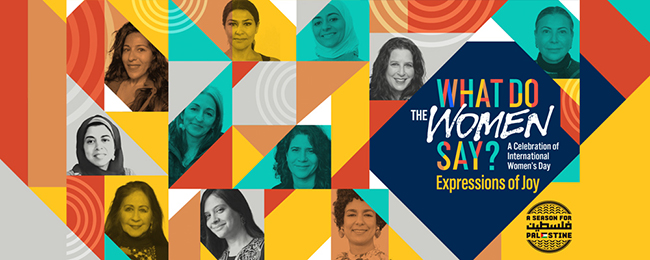
Golden Thread Productions is a San Francisco-based theatre company, which focuses on Middle Eastern artists. Since 1996 their productions have put a human face on the conflicts in Iran, Iraq, Afghanistan, and other Middle Eastern countries. In response to the crisis in Gaza, this year’s season is dedicated to Palestine.
Golden Thread’s performances remind us of the crucial role that artists can play in helping us understand the people in other countries. Most people in the United States will never have a chance to visit the Middle East, and our news media tends to focus on casualty counts without much historical or cultural context.
But sitting in the audience in a darkened theater, we can often gain insights that are not available anywhere else. We can see the identity and humanity of each community through its cultural traditions. We can gain empathy for the pain of displacement and the terror of violence, and we can learn to recognize each group’s music, dance, and other art as an expression of their essential spirit that sustains them during hard times.
This year Golden Thread’s annual International Women’s Day event will feature a tribute to Nabila Mango, a leader of the local Arab community, Arabic music performed by the Aswat Ensemble, Palestinian dabke dancing by the Al-Juthoor company, and excerpts from two plays by Palestinian women. There will also be Palestinian food and a display of Palestinian embroidery in the lobby before the show.
Nabila Mango, Arab Leader & Founder of the Aswat Ensemble
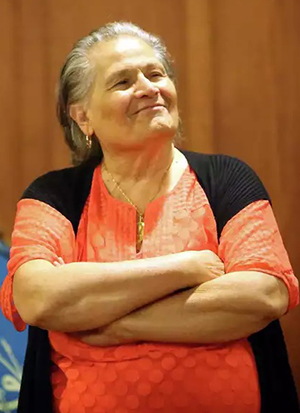
Expressions of Joy will feature a special tribute to Nabila Mango (1944-2023) performed by members of the Aswat Ensemble, the Arab musical group she founded. (“Aswat” means “voices” in Arabic.) Mango was a Palestinian leader in San Francisco’s Arab community and a strong advocate for building cross-cultural understanding through the arts.
Born in Jaffa in 1944, Mango was 4 years old when her family was pushed out of its home in 1948 during the Nakba, the mass exodus of hundreds of thousands of Arab Palestinians from regions that became parts of the new Israeli state. With her parents and four siblings, Mango walked from Jaffa (now part of Tel Aviv) to Jordan.
In 1965 she immigrated to the United States to study library science, and in the late 1970s, she made her way to California where she raised her family and became a passionate advocate for preserving Arab culture and educating both Arabs and non-Arabs about it.
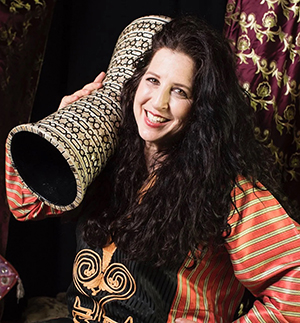
Aswat Ensemble Member
By forming the Aswat Ensemble, she was able to combine her interests in education, cultural preservation, and community building. The group plays folkloric, classical, and contemporary Arabic music which helps immigrants feel welcome, and helps American-born Arabs understand their heritage. She also welcomed non-Arabs into the ensemble to encourage cross-cultural understanding.
Although she had no formal musical training, Mango was considered an expert not just in Palestinian songs and rhythms but in music from every nation with a sizable Arabic population. She had one of the most extensive Arabic music collections in the U.S.
The Al-Juthoor Dabke Dancers
The Al-Juthoor dancers will perform a traditional Palestinian dabke dance. “Al-Juthoor” means “roots” in Arabic, and dabke is an energetic social folk dance that originated in 3000 BCE in the Levant – an area that includes Palestine, Jordan, Lebanon, Iraq and Syria. It is connected to ancient fertility rites, and some oral histories indicate that it evolved from a community technique for roof repair. A group of neighbors would climb onto a roof, and walk across it in a line, adding mud, twigs and stones by stamping their feet. They would link arms to prevent anyone from falling into a hole. The dance is now done at weddings and other community celebrations, and it is widely recognized as a joyful expression of Palestinian identity.
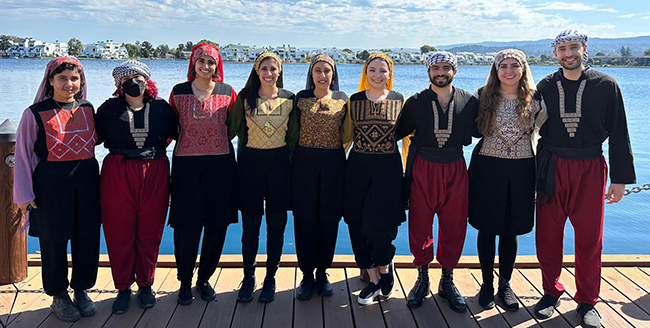
Excerpts from Two Plays by Palestinian Women
The evening will also include excerpts from a musical work-in-progress written and composed by the Palestinian-American artist, Amal Bisharat and excerpts from an autobiographical play by Palestinian author Raeda Taha.
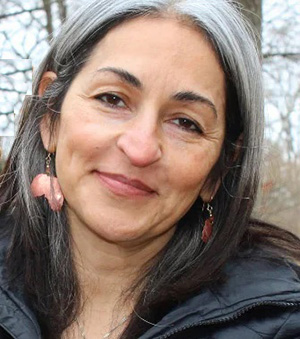
The musical is based on the novel Mornings in Jenin (2010) by Susan Abulhawa, which traces four generations of a Palestinian family that was forced to move from their home to a refugee camp in Jenin when the state of Israel was formed in 1948.
Translated into thirty languages, the book has been an international bestseller that has made Abulhawa the most widely read Palestinian author. Abulhawa’s own parents were refugees of the 1967 Six-Day war, which ended with Israel in control of Gaza.
Raeda Taha’s family also moved from Jerusalem to Jordan following the 1967 Six-Day War, and her father was a Palestinian freedom fighter who was killed when she was only seven years old. Her piece, Where can I find someone like you, Ali?, is an autobiographical one-woman show about her experience as the daughter of a shaheed (martyr) and ultimately about the experience of many of those left behind by Palestinian martyrs.
Get Your In-Person or Streaming Tickets!
Event: What Do the Women Say? Expressions of Joy
Place: Brava Theater, 2781 24th St, San Francisco, CA 94110
Date & Time: Friday, March 8, 2024 – Doors open at 6:30 p.m. and the show starts at 8 p.m. There will be Palestinian food and a display of Palestinian embroidery in the lobby before the show. (Running time: 2 hours)
Prices: $25 – $100 General Admission. No one will be turned away for lack of funds.
Get your tickets for the in-person or streaming show on the Golden Thread website.
